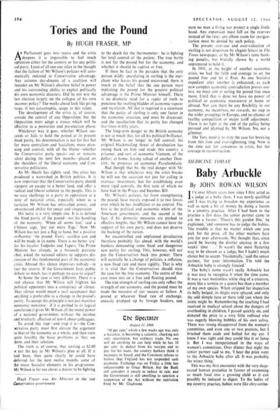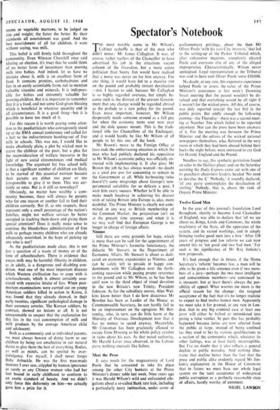Baby Arbuckle MEDICINE TODAY
By JOHN ROWAN WILSON
IT'S over fifteen years now since I first acted as a judge at a baby show. I was newly qualified and I was trying to broaden my experience as well as earn a bit of money by doing a locum • in a country practice. After I had been in the practice a few days the senior partner came to ask me a favour. 'There's this garden fête,' he explained, 'and someone has to judge the babies. The trouble is that no matter which one you pick for the prize, all the other mothers hate you for ever afterwards. We thought that, since you'd be leaving the district anyway in a few weeks' time . . .' It wasn't the most flattering way to be chosen as a judge, but I hadn't much choice but to accept. 'Incidentally,' said the senior partner, 'for your information, I'm told the Arbuckle baby is strongly fancied.'
The baby's name wasn't really Arbuckle but it was easy to recognise it when the time came. It was a vast motionless white slug of a creature, more like a termite or a queen bee than a member of my own species. When stripped for inspection its belly bulged, its thighs were splayed, and only the odd dimple here or there told you where the joints might be. Remembering the teaching I had received in medical school about the dangers of overfeeding in children, I passed quickly on, and donated the prize to a wiry little redhead who was eagerly blowing bubbles of his own saliva. There was strong disapproval from the women's committee, and even one or two protests, but I brushed them aside and bolted for my car. I knew I was right and they could like it or lump it. But I was inexperienced in the ways of women's committees. Over dinner that night the senior partner said to me, 'I hear the prize went to the Arbuckle baby after all. It was probably the wisest thing.'
This was my first encounter with the very deep- seated human prejudice in favour of cramming as much food into a growing child as it can possibly be induced to digest. To the ladies of my country practice, babies were like chrysanthe- mums or vegetable marrows, to be judged on size and weight; the fatter the better. By their standards all nourishment was good. And the best nourishment of all for children, it went without saying, was milk.
This belief is still firmly held throughout the community. Even Winston Churchill once said (during an election, it's true) that he could think of no better form of investment than pouring milk into babies. And indeed, let us have no mistake about it, milk is an excellent form of food. It contains proteins, carbohydrates and fats in an easily assimilable form, not to mention valuable vitamins and minerals. It is indispens- able for babies and extremely valuable for growing children. But it is important to remember that it is a food, and not some God-given blessing which is beneficial in whatever quantity and in all circumstances. It is a good thing—but it is possible to have too much of it.
For this reason it is worth paying some atten- tion to the paediatricians who courageously stood up at the BMA annual conference and called for a halt to the indiscriminate handing-out of free milk in schools. This was not, I would like to make absolutely plain, a plot by wicked men to starve the children of the poor, but a plea for the reconsideration of welfare measures in the light of new social circumstances and medical knowledge. The argument for free school milk is that a significant number of children are likely to be starved of this essential nutrient because their parents are either too poor or too irresponsible to give it to them. This was cer- tainly so once. But is it still so nowadays?
Obviously, no matter how wealthy a com- munity becomes, there will always be parents who for one reason or another fail to feed their children correctly. But if, as one suspects, these represent only a small percentage of the nation's families, might not welfare services be better occupied in tracking them down and giving them special attention? Does it really make sense to continue the blunderbuss administration of free milk to perhaps twenty children who are already adequately nourished, in the hope of picking up one who is not?
As the paediatricians made clear, this is not just a question of a waste of money or of the time of schoolteachers. There is evidence that excess milk may be harmful. Obesity in children, as in adults, is a dangerous and disabling con- dition. And one of the most important diseases which Western civilisation has to cope with is arteriosclerosis, which is almost certainly asso- ciated with excessive intake of fats. When post- mortem examinations were carried out on young American soldiers killed in action in Korea, it was found that they already showed, in their early twenties, significant pathological damage in their coronary arteries. The Korean soldiers, by contrast, showed no lesions at all. It is not unreasonable to suspect that the explanation for this lies in the vast consumption of milk and milk products by the average American child and adolescent.
Both as a community and as individual parents, we must always beware of doing harm to our children by being too unselective in our natural desire to give them the best of everything. Bodies, as well as minds, can be spoiled by over- indulgence. For myself, I shall never forget Baby Arbuckle. He was the first man-made monster I ever saw, crippled by human ignorance as surely as any Chinese woman who had her feet bouncl in early childhood to conform to an exotic standard of beauty. And we didn't only force this deformity on him—lite actually gave him a prize for it.































 Previous page
Previous page